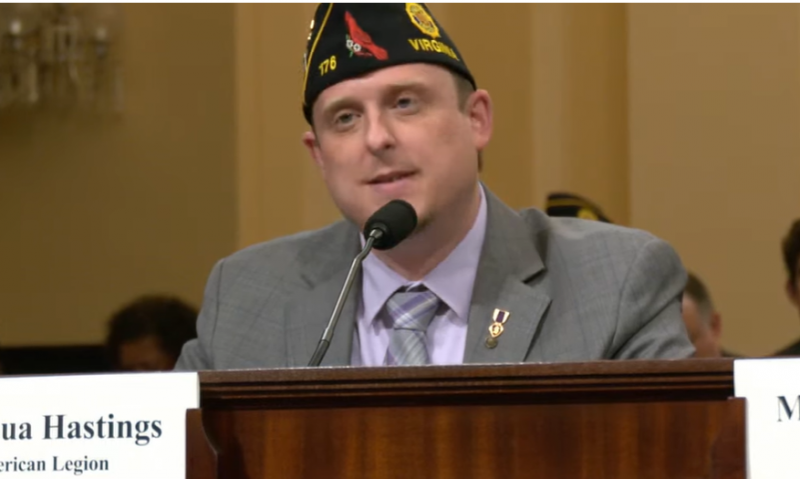
American Legion expresses support for pending legislation impacting VA benefits delivery, accountability
Legislation that would speed up Department of Veterans Affairs (VA) benefits process, improve its procurement and acquisitions efforts, increase security at VA facilities and add more teeth to existing accountability legislation received support during congressional testimony delivered by The American Legion on July 12.
Joshua Hastings, the Legion’s Veterans Benefits Policy Analyst in the Veterans Affairs & Rehabilitation Division, spoke before the House Committee on Veterans’ Affairs Subcommittee on Oversight and Investigations on support for a variety of pending legislation, including the Legion’s support for H.R. 196 – Expediting Temporary Ratings for Veterans Act. The bill would direct the Secretary of Veterans Affairs to modify VA’s information technology systems to provide for the automatic processing of claims for certain temporary disability ratings, and for other purposes.
“The processing of temporary disability ratings has been identified as a backlog barrier for than a decade,” Hastings told the committee. “Processing issues have led to substantial financial errors and contributed to unreasonable delays. The time it takes VA to grant such ratings ranges from a couple weeks to a couple months. There is no consistency.
“Veterans should receive their benefits in a consistent and timely manner. The American Legion believes increased automation can help reduce the claims backlog and deliver these benefits more efficiently.”
A service-connected combat veteran, Hastings also stated Legion support for H.R. 4225 – VA Acquisition Review Board Act, which would establish the Acquisition Review Board of the Department of Veterans Affairs. He used VA’s struggles with the rollout of its Electronic Health Record Modernization (EHRM) program as an example of why the legislation is needed.
“VA has a crucial mandate to ensure the procurement of goods and services is optimized to meet our nation’s veterans,” he said. “A 2022 (Government Accountability Office) report highlighted the VA’s approach to acquisitions was varied and unstandardized, leading to oversight difficulties and subpar acquisition outcomes. Moreover, the VA’s EHRM program mirrors this chaotic nature. In the wake of mismanagement and delayed problem resolution, its deployment has been stalled since June 2022, with costs escalating to an exorbitant $59.12 billion.
“Creating a standardized and transparent framework for managing major VA acquisitions would heighten accountability and contribute to a more uniform acquisition process, boosting the efficiency of VA procurement and ultimately enhancing the provision of care for veterans. This legislation would also help to facilitate VA’s ongoing efforts to modernize the EHRM system by ensuring the effective implementation of single system across VA and bi-directional connectivity to the Department of Defense. The American Legion believes this is essential in reducing further delays and unnecessary expenditures.”
Support also was given for H.R. 4278 – Restore Department of Veterans Affairs Accountability Act, which amends the U.S. Code to modify personnel action procedures with respect to employees of the Department of Veterans Affairs.
“In 2017, Congress passed the VA Accountability and Whistleblower Protection Act to increase staff accountability and improve protection for whistleblowers. In August of 2021, it was found that VA misinterpreted this act by the United States Court of Appeals,” Hastings said. “One of the protections assumed in this legislation was to mitigate the involvement of the U.S. Merit Systems Protections Board in certain decisions surrounding the employee. However, there was nothing written in the law to do so. This lack of clarity has allowed courts to dilute the VA secretary’s authority to hold employees accountable, protect whistleblowers and keep veterans safe.
“Veterans deserve a process that delivers swift accountability for front-line workers, middle managers and even senior executives. We must ensure VA leaders possess the tools necessary to hold bad actors accountable and protect those seeking a more productive and safer work environment.”
And finally, Hastings voiced The American Legion’s support for H.R. 3504 – VA Medical Center Security Report Act which directs the Secretary of Veterans Affairs to submit to both the House and Senate Committees on Veterans’ Affairs an annual report regarding security at VA medical centers.
“The American Legion has also grown increasingly concerned that the safety of our veterans, staff and patients at VA facilities is in decline,” Hastings said. “A recent OIG report highlighted severe understaffing, a lack of proper training and various security vulnerabilities. This includes an unsettling 33 percent average vacancy rate in officer positions across 70 medical facilities – and in some cases, this rate soared to over 60 percent. This has led to multiple serious incidents, including a bomb threat and firearms being discharged.
“The American Legion firmly supports legislation that ensures the safety of our veterans extends beyond providing quality medical care. We must do more to improve oversight of VA policing and set a foundation for enhanced safety protocols and more effective staffing strategies.”
Read Hastings submitted written testimony here.
